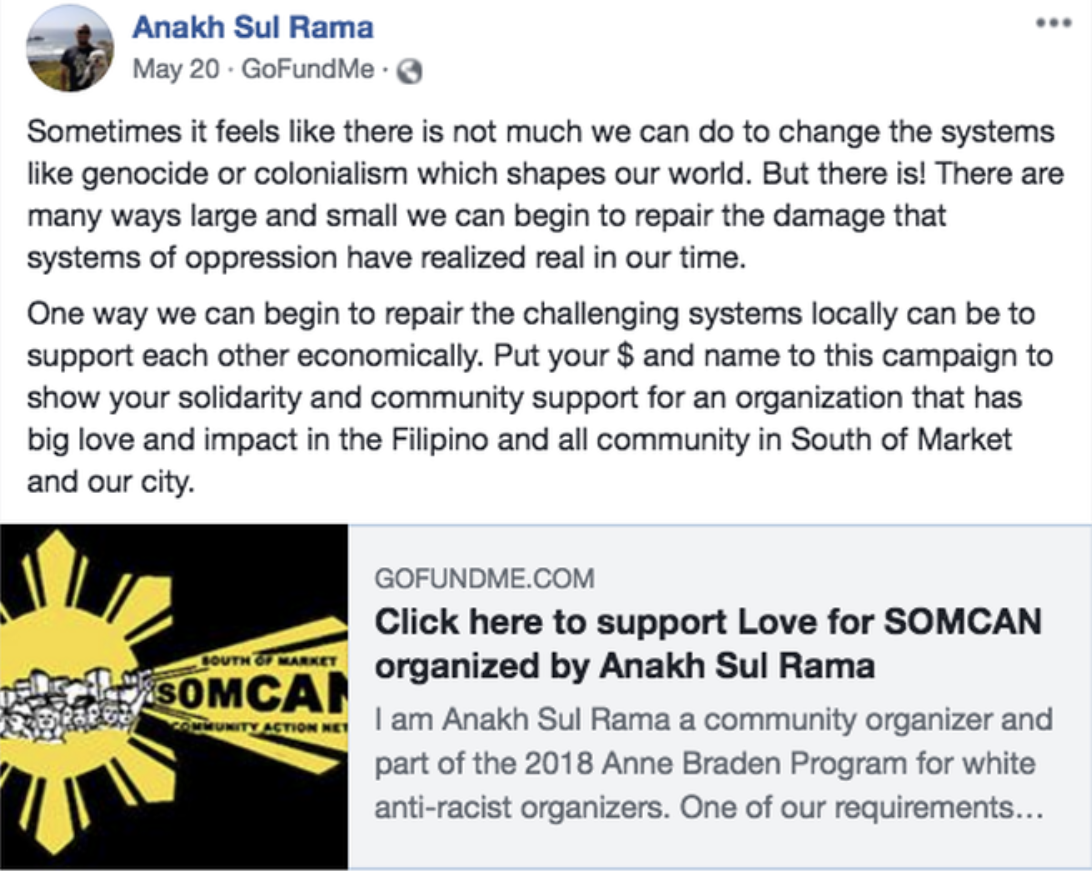Donor Spotlight: Anakh Sul Rama
As part of the Catalyst Project's Anne Braden Program for White organizers, Anakh Sul Rama recently chose to partner with SOMCAN, as a "people-of-color-led organization", to raise money to ease the burden of fundraising and allow staff to focus more on their mission. Through the use of online crowd-funding, he raised $300 that will go towards supporting and strengthening the low-income, immigrant community in the South of Market.
Rama shared his thoughts on racial justice work, the experiences that shaped him, and why he chose SOMCAN:
"I am Anakh Sul Rama, I am a LGBTQ HiV+ Refugee from Texas and came to San Francisco to seek opportunity and acceptance over a decade ago. I am a survivor of child abuse and am a thriving, formerly-homeless community member. I organize with formerly-homeless people in supportive housing at the intersections of housing, economics, ability, education and experience.
I joined Catalyst Project’s Anne Braden Program which is a training specifically for White organizers organizing other white people around anti-racism. The program went from February till the end of May. Unfortunately, due to ongoing illness, I was not able to complete the program but I am excited for the collaborations and allyship it has brought to me.
White supremacy and systems of oppression are based on the dynamics of racism. Even though I was struggling within our systems of racialized capitalism as a White homeless person, I still navigated that experience with my White privilege. Even though I had been kept in a cage and made to do hard labor as a kid being abused, I experienced that in a upwardly-mobile, White privileged family. The healing from that trauma has been life-long and intense, yet, I do not also have to navigate and heal from the racial trauma given my privileged skin.
I chose SOMCAN because I appreciate the work that the organization does in the South of Market neighborhood specifically with the Pilipino community. I know that we are all part of a wider housing community and when SOMCAN asked for support on a campaign against a development project awhile back, the wider community was not able to support. I chose to partner with SOMCAN because I think it's important to show personal solidarity even when organizational ties may take us in another direction. Because of this solidarity component, I think it was more difficult to find supporters willing to step over that line. I was surprised that more folks did not join in and donate, however I did shorten the time because of illness.
White organizers that want to do racial justice work need to be informed by the people they are doing the work for, people of color. We also need to know when to step up and when to step back. We especially need to be aware of how we can support the work already being done by people of color and not recreate the wheel to center ourselves. White organizers doing anti-racism work have to confront and unlearn our own ingrained racism to be effective. This is a life-long process for the White anti-racist organizer and it will not look neat and tidy. It will be messy, painful and hard. We have to do it.
I feel like my role in racial justice moving forward is supporting and developing the leaders of tomorrow. We need more people out there saying yes, you have been hurt and marginalized but you are the best expert because of your lived experience. We need more people willing to step back so that our next generations of leadership can step forward, fully supported. I see my role is somewhere between the points of agitation and empowerment. I want people to be unnerved by these systems of racial oppression so much that they are mobilized to empowerment and action by it."


